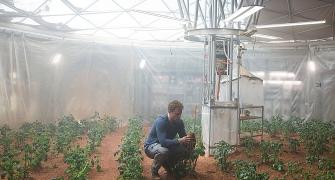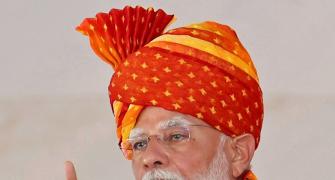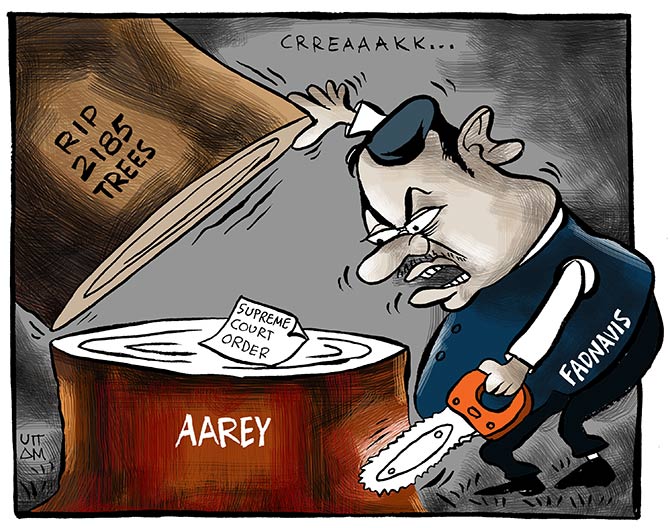Mumbaikars from different parts of the city are providing people with ready-to-grow seed balls to help tackle depleting forest cover, reports Swapnil Joglekar.

When Chitra Chauhan, 40, read about the depleting forest cover in Mumbai, she was distressed.
There's a reason to be as, according to the government, the ministry of environment cleared the cutting of 1.09 crore trees in the past five years across the country.
Studies suggest the situation is equally bad everywhere but, in some places, the situation is worse than others.
Take Delhi for example, where state government data shows that, since 2005, a tree is cut almost every hour.
So Chauhan set up Beej Box (BB), a platform that provides 10 seed balls for Rs 100, which need to be chucked in the soil to grow a plant.
"It was all about making it easier to save the environment," Chauhan explains.
Utkarsh Gangwar, 27, realised the importance of branding the product well and joined in as the project manager.
Chauhan and Gangwar had done their MBA together and wanted to make a difference to the environment.
"Usually, the rate of germination in the case of seed balls is between 10 and 50 per cent. We have raised it to 60 per cent," says Gangwar.
The process involves mixing soil, compost and coco peat (cleaned, washed and dried coconut husk which has water retention and anti-weed properties).
These are rolled into a ball and a cavity is formed to fit in the seeds.
The balls are dried under the sun, labelled and stored in crates.
Plants such as marigold, tomato, gulmohar (royal poinciana), bel (Indian bael) and sitafal (sugar-apple) are available.
"I was intrigued by the concept. The germination rate is healthy and it's a nice idea for gifting too," says Sangita Wani, one of their regular customers.
BB took roots through self-funding and has workshops in Juinagar, Chiplun, Pen and Bhiwandi (all near Mumbai), where they recently finished an order for 10 lakh seed balls in two and a half months, employing 250 women.
Bindu, who has worked here for more than 10 months says, "We know the seeds are so expensive. It is our responsibility to make sure that the ball is of the right size and that it germinates".
From their next consignment, they are going to add hydrogel to the seed balls that they say can help retain water and save the seed from wilting in the crucial first 10 days.

The concept of seed balls is not new.
In ancient Egypt, seed balls were used to restore farmland after the Nile's annual spring flood.
The Japanese called it tsuchi dango, or earth dumplings.
In the early 20th century, microbiologist and agriculturist Masanobu Fukuoka revived the practice and made it a part of his natural farming movement.
The 1970s saw it used as a tactic of guerrilla gardening, a movement that rehabilitates abandoned land in need of care.
Harsh Vaidya, 35, another Mumbaikar agrees.
He established The Tree Box (TTB) in October 2018.
"My idea was to get that concept and mould it into what people wanted here. Now we have 100 different varieties including tall trees, kitchen garden sets and flowers in the form of seed balls."
TTB uses a mixture of alluvial soil, coco peat and panchgavya (a mixture of cow dung, cow urine, milk, curd and clarified butter) to make the balls.
A package containing tulsi (basil leaves) seeds can be buried too.
An urban organic farmer since the last 12 years, Vaidya started by hiring eight women to make the seed balls.
Now TTB has 248 women on its rolls, paid according to the Sixth Pay Commission.
Starting with an investment of Rs 10,000, he sourced the raw material from his farm at Umargaon (in Gujarat).
Some petrol pumps and departmental stores in Maharashtra now gift the product to customers making purchases above Rs 1,000.
Some of the ISKCON temples on Janmashtami and, Lalbagcha Raja, one of the most famous Ganesh pandals from Mumbai, gave seed balls bought from TTB to devotees.
"We earlier offered it for free, but the corporates didn't take us seriously," Vaidya says.
The acceptance through social media helped break this barrier.
Now TTB has set up distribution networks in South Africa, Dubai and Europe, with plans to branch out to the United States in the coming months.
So next time you are out on the road, carry a pack of seed balls.
Your simple act of kindness might give a breath of fresh air to the generations to come.










